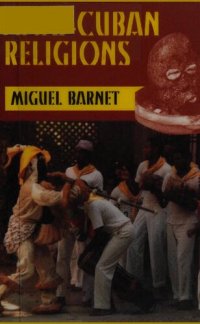
Ebook: Afro-Cuban Religions
Author: Miguel Barnet
- Genre: Other Social Sciences // Ethnography
- Tags: afro-cuban religion, regla de ocha, palo, santeria
- Year: 2001
- Publisher: Markus Wiener Publishers
- City: Princeton
- Language: English
- pdf
African-derived religions enrich all aspects of Cuba's social, cultural, and everyday life, and encompass all ethnic and social groups. Politics, art, and civil events such as weddings, funerals, festivals, and carnivals all possess distinctly Afro-Cuban characteristics. Miguel Barnet provides a concise guide to the various traditions and branches of Afro-Cuban religions. He distinguishes between the two most important cult forms—the Regla de Ocha (Santeria) and the Regla de Palo Monte. Regla de Ocha promotes worship of the Orisha (gods), and uses traditional oracles that originated in the old Yoruba city of Ile-Ife. The Regla de Palo Monte came from the Congo area. The term palo refers to the ritual use of trees and plants, whiten are believed to have magical powers.
Africans who were brought to Cuba as slaves had to recreate their old traditions in their new Caribbean context. As their African heritage collided with Catholicism and with Native American and European traditions, certain African gods and traditions became more prominent while others lost their significance in the new Cuban culture. The author also discusses the roles of music and dance as forms of Cuban religious expression and describes the specific instruments and symbols they employ. The book ends with an enthusiastic depiction of Barnet's recent research journey to West Africa, the Land of the Orishas.
MIGUEL BARNET, director of the Fernando Ortiz Foundation in Havana, is the author of Biography of a Runaway Slave and numerous other books, which have been translated into several languages.
Africans who were brought to Cuba as slaves had to recreate their old traditions in their new Caribbean context. As their African heritage collided with Catholicism and with Native American and European traditions, certain African gods and traditions became more prominent while others lost their significance in the new Cuban culture. The author also discusses the roles of music and dance as forms of Cuban religious expression and describes the specific instruments and symbols they employ. The book ends with an enthusiastic depiction of Barnet's recent research journey to West Africa, the Land of the Orishas.
MIGUEL BARNET, director of the Fernando Ortiz Foundation in Havana, is the author of Biography of a Runaway Slave and numerous other books, which have been translated into several languages.
Download the book Afro-Cuban Religions for free or read online
Continue reading on any device:

Last viewed books
Related books
{related-news}
Comments (0)